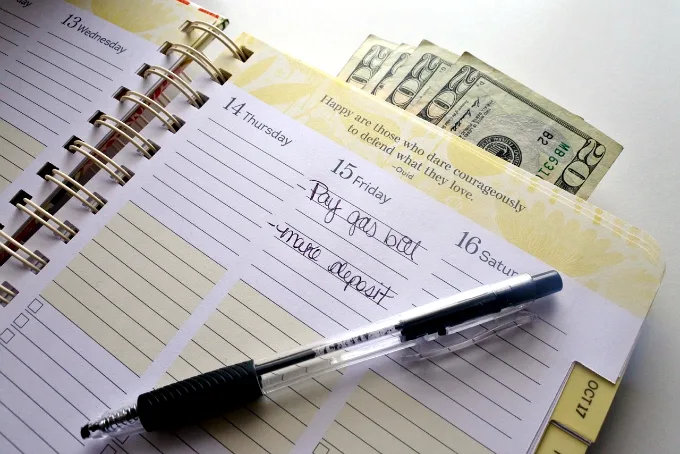Simple tips to help you save money even when your income is limited and your budget is tight!
Do you want to have some savings set aside for emergencies or to pay off debt, but feel like there’s no room in your budget for it? I’ve been there and know the feeling all too well.
It’s easy for experts to advise us to save, but what do you do when you have no income to pull from?
I know it seems impossible, but with careful planning, it can be done. Today I’m sharing some tips to help you save money even when you’re barely surviving.
Increase your income
- When was the last time you asked for a raise? This is one of the easiest ways to immediately increase your income. I used to be a manager and was always surprised when my employees didn’t even attempt to ask!
- Can you start a sideline business? There are many business ideas that require little or no overhead.
- Can you reduce your tax withholdings or drop unnecessary deductions? Make sure you’re not overlooking something that could easily increase your net pay.
- Can you sell some items on Craigslist or eBay? Look around your home and find items to sell that you don’t use, but may be of value to someone else.
Decrease your expenses
I know this one is common sense, but it’s one that many people don’t pay attention to. I often hear; “Our budget is already down to the bare necessities so how can I lower my expenses even further?”
Go over your budget with great detail and ask yourself the following:
- Can you decrease any of your utilities?
- Can you find creative ways to lower your food budget?
- Do you order take-out more often than you originally thought?
Find any leaks in your budget by keeping track of what you spend for at least a month. Figure out where your money is going and what you can do to decrease it.
Start small and make it automatic
So you went over the first two steps and find out you only have an extra $10 per week in your budget to put towards savings. Although it may not seem like much, you’re already a step ahead. Every little bit counts.
That $10 per week can amount to $520 per year! Once you begin to see your savings grow, you’ll be motivated to put even more towards it.
Each month go over your finances to see if you can increase what you allocate towards savings.
Before you know it, you’ll have a nice cushion set aside. It’s very easy to get off track when something unexpected comes up.
Treat your savings like you would a utility bill and make it non-negotiable.
If you have automatic withdrawal at work, funnel your savings amount into a bank account that you don’t use so you’re not tempted to spend it.
Do you set money aside for savings? What do you find helps you budget for it? I would love to hear from you!





[…] How to Save Money When You’re Barely Surviving on The Latina Homemaker. Tips on how to save money, even when you’re bringing in hardly any income. […]
These are great tips Jesenia!
We’ve found that eliminating lots of little purchases from our budget has really helped us to be able to set money aside for savings. I stopped going to Starbucks every day, buying lunches out, and made my grocery shopping more of a strategy instead of just an afterthought….among other things. It all adds up so quickly!
This is a long post, but I believe it will be helpful to anyone seriously struggling with debt. This is for folks who have very little income, not for the ones who have enough money to pay off $30,000 in debt in six months.
I, too, got through a time of financial hardship with some creative budgeting. My budget was always wrecked by some unforeseen surprise, and the last 1 1/2 weeks of the month were difficult with non existent resources. My mantra became, ” If I have gas in the car, I can get to work. If I can get to work, I can get a paycheck. If I can get a paycheck, I can survive.” My first goal was to make sure the car always had gas in it, but I wanted more than just to “survive.”
The very hardest thing was to start by making an honest list of all my debts. It was oppressive to see, but I had to be honest with myself.
I had my regular checking and savings account at a credit union, and I opened a second savings account at a different credit union so I had to make an extra effort to get to it.
Next, I made a list of everything to be paid monthly. Then I looked at my previous year’s calendar, and made a list of everything paid bi-monthly, bi-annual, and annual. This included birthdays, holidays, insurance premiums, etc. I divided this amount by 12 months for the amount needed to save each month to cover these things. It seemed impossible to save this much each month into the second savings account. I added a few dollars extra hoping to begin to build a cushion. I had this monthly amount posted into my second credit union savings account, or as much as I could in the beginning.
The first time I drew out the budgeted Christmas amount was wonderful knowing I wouldn’t have Christmas debt to pay in Jan, Feb, Mar, etc.! And the first time I paid an insurance premium in full was wonderful knowing I didn’t have to worry about it for another year!
Now I had a monthly budget that I could work with and the ability to handle most of the rest of my financial obligations. There were still some dings here and there, but I could work them out more easily.
It took about six months to get to the point where I could function with saving the monthly amount I needed on this type of budget. I still had to rob Peter to pay Paul at times, but month by month I got closer and closer until this plan worked as I expected it to.
Now for my debts – I think they call it snowballing now. Start with the smallest debt a feeling of accomplishment. I paid the minimum on the rest, and when I could, I paid more on the smallest until it was paid. Next, I put that money on top of the minimum of the next debt and so on to the next debt. Seeing that debt list grow smaller gave me incentive to continue. When the debt was finally gone, I used that debt money for some long-term savings.
There were times I ate only carrots to save on food, but it worked, and I was able to pay off my debts and save money, too. I cannot say the depth of gratitude I felt when I reached this goal. The most interesting thing for me is that it didn’t take as long as I thought it would.
This was the best advice I’ve seen by far. I’m going to use most of these ideas. I’m excited to get started. I have started one project listed and ready for the next. Thank you so much for such much to work with!
Thanks for sharing and thanks for being open about your journey. I agree, listing and facing your debts is one of the hardest things a person can do, but ignoring them won’t help. I also like the snowball method and it’s what I’ve done myself. Something about having the debt gone (even if it’s small) is super motivating for me. Thanks again for sharing your encouraging story! 🙂
We started doing automatic withdrawals to our savings account and our kids’ college funds. It’s really nice to know that even while it may only be a little bit each month that at least we’re doing something and because it comes out automatically, we’re not tempted to spend it on something else.
I have used the multiple account strategy for years. It really works. I have one account for long term savings- emergency, one for short term savings – Christmas, birthdays, and then my regular daily account. They are all three at separate banks so I can’t easily transfer money. The short term savings has a debit card that I leave at home in a drawer and only use when needed. The long term savings account has no debit card and no checks. If I need this money, I have to go into the bank to get it. This method really works, and as I have shared it with friends it has really worked for them, too.
That’s great Felicia! I don’t think people realize how easy it is and what a difference it could make. Thanks for sharing! 🙂
[…] a Budget The Latina Homemaker – How to Save Money When You’re Barley Surviving – Fab few things to think about on here! Sarah Titus – Money Saving Tricks – 30 […]
[…] How to Save Money When You’re Barely Surviving […]
[…] How To Save Money When You’re Barely Surviving-Simple tips to help you save money even when your income is low and your budget is very tight. […]
[…] How To Save Money When You’re Barely Surviving – May 28 […]
[…] The Latina Homemaker {How to Save Money When You’re Barely Surviving} 2. Life in the Orchard {Making Do and Pinching Pennies} 3. Carrie This Home {Easy Ways to Save […]
One of the most important things is to try to make what you do spend count for more. Be thoughtful about your purchases, and try to make your spending an investment rather than something you consume and it’s gone. Hello from Thrifty Thursdays.
That’s a great way to look at it Melissa. Thanks for the tips!
I love how you put the savings in perspective. If we treated our major utility bills like we did our savings, there’d be a lot of people without lights these days! If it’s non-negotiable, you’re more apt to keep in the habit of a solid deposit. Brilliant!
Hi Emyle! I find that if I make it optional I simply won’t follow through with it when things get tight so this helps prevent that. Thanks for stopping by! 🙂
Great tips Jesenia! I love the tip of making an automatic small deposit each week. That doesn’t hurt too much but by the end of the year it amounts to a lot! I’ll be pinning this to my money saving ideas board!
Thank you Carrie! It sure does add up and it also helps motivate me to increase what I’m already saving.